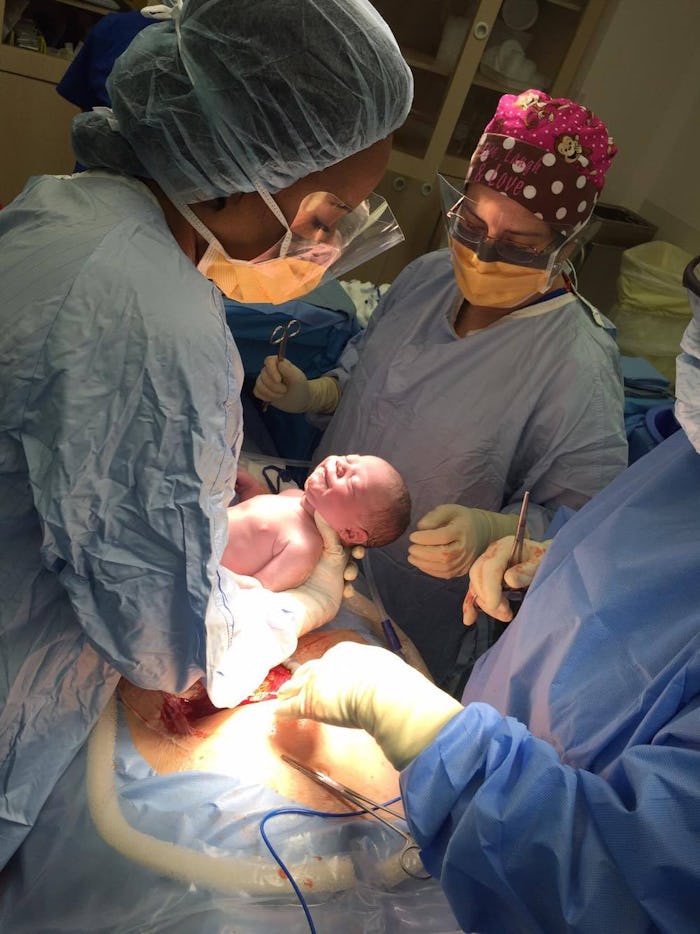Life

How Does Having A C-Section Affect Breastfeeding?
If you have gotten the news that you will need a scheduled C-section, or if you fear that you will be one of the estimated one in three moms in the U.S. who will deliver via cesarean this year, you might be wondering, how does having a C-section affect breastfeeding? There are a lot of myths surrounding breastfeeding after a C-section, and lots of misinformation passed down from generation to generation. The fact is that a C-section, in most cases, will not prevent you from being able to follow through with your dreams of nursing your baby.
Our mothers and grandmothers were led to believe that if they had a C-section, they could not or should not breastfeed their babies. Newly delivered babies were whisked away to the nursery while moms recovered (often from general anesthesia) and were given a bottle of formula by a nurse. There was little encouragement or support given to moms who wanted to breastfeed. In fact, according to the Journal of Pediatric Nursing, prior to the 1990s, many new mothers were regularly offered lactation suppression medications such as parlodel and bromocriptine. These drugs were eventually found to have brain-related side effects and are no longer approved for use in milk cessation.
Today, moms are awake and alert during their C-sections, and hospitals are staffed with lactation consultants who are trained to assist you in breastfeeding after a C-section. Even mothers of babies who must go to the NICU are encouraged to breastfeed or pump. That said, breastfeeding after a C-section can be a little different than if you have a vaginal birth.
Here are some ways that having a C-section delivery can affect breastfeeding.
1Your Milk Might Be Delayed
According to Kelly Mom, a stressful or traumatic birth, whether vaginal or C-section, can cause your milk to come in a little later. Typically, milk comes in anywhere from two to six days after delivery, most often around the third day. Even if you milk hasn't come in, continue to bring the baby to the breast often to help stimulate milk production and provide your baby with colostrum. You should also keep in regular contact with your lactation consultant and pediatrician to make sure your baby is getting enough to eat during this time. Belly Belly noted that early skin-to-skin contact with your baby and breastfeeding within the first hour after delivery can help prevent a delay in your milk coming in.
2It May Be A Challenge To Find A Comfortable Breastfeeding Position
The traditional cradle hold is usually very uncomfortable after a C-section, according to Parents. Try positioning your baby in the football hold, where baby is tucked beside you, or you can try breastfeeding while lying down. Kelly Mom suggested positioning your baby lying face down across your breasts (similar to cradle hold, but the baby is higher up across your breasts, and you are lying flat). It's important to have someone nearby to make sure baby’s nose doesn’t get blocked, and use lots of pillows for support.
3Your Baby May Get Thrush
According to the Centers For Disease Control and Prevention (CDC), oral thrush is a fungal infection caused by a yeast Candida albicans. The antibiotics you take after a C-section can kill off the good bacteria that controls yeast, and can trigger an overgrowth of yeast in your baby's mouth. Thrush looks like a thick white coating on the baby's tongue and inside of the mouth. Alpha Mom recommended talking to your doctor about starting a probiotic regimen prior to childbirth to help prevent thrush in the event that you need to take antibiotics, or if you know for sure that you will be getting a C-section. Probiotics are also a good idea for the recovering mom who won't want to deal with a breast or vaginal yeast infection on top of everything else.
4You Will Need Some Help
A C-section is major surgery, and even the most minor tasks will require help at first. If your spouse can't afford to take some time off from work, Kelly Mom suggested reaching out to family or friends to help you out with housework and chores until you are back on your feet again. Not having to worry about the laundry or dishes in the first couple of weeks will help you relax so you can focus on breastfeeding and bonding with your baby.